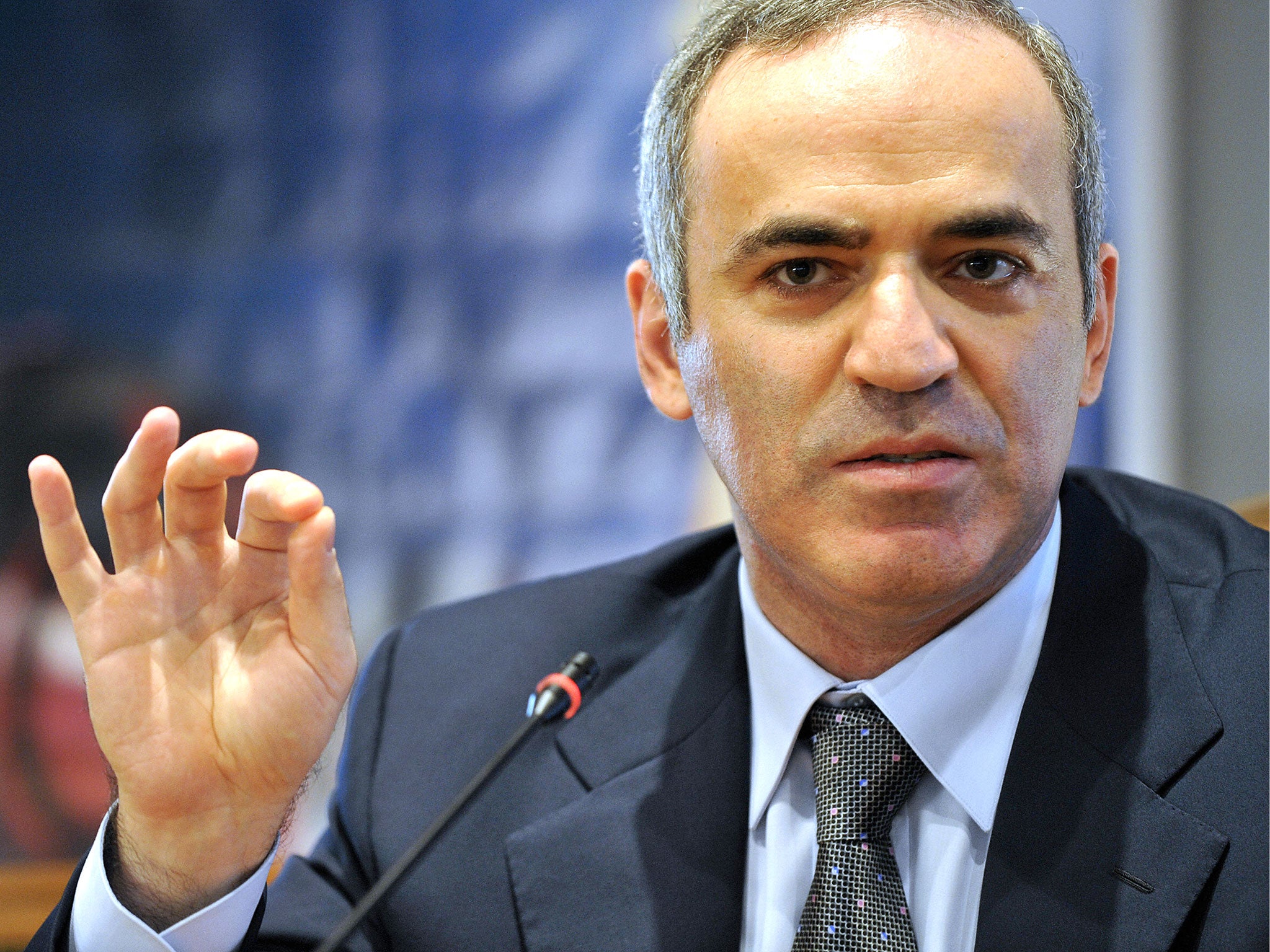Winter Is Coming by Garry Kasparov, book review: A flawed yet vital look at Russian politics
The former world chess champion turned Russian opposition leader recognises only light and dark, right and wrong

Your support helps us to tell the story
From reproductive rights to climate change to Big Tech, The Independent is on the ground when the story is developing. Whether it's investigating the financials of Elon Musk's pro-Trump PAC or producing our latest documentary, 'The A Word', which shines a light on the American women fighting for reproductive rights, we know how important it is to parse out the facts from the messaging.
At such a critical moment in US history, we need reporters on the ground. Your donation allows us to keep sending journalists to speak to both sides of the story.
The Independent is trusted by Americans across the entire political spectrum. And unlike many other quality news outlets, we choose not to lock Americans out of our reporting and analysis with paywalls. We believe quality journalism should be available to everyone, paid for by those who can afford it.
Your support makes all the difference.There is a sense in which the subtitle to Garry Kasparov's book – “Why Vladimir Putin and the enemies of the free world must be stopped” – tells readers all they need to know. This is an exposition – forcefully and passionately argued, yes – of a view of contemporary Russia that comes straight from the playbook of those US Republicans who still feel more at home with the verities of the Cold War than with the shifting political sands of today.
This is a world in which Ronald Reagan is a hero because in dubbing the Soviet Union “the evil empire”, he told it how it was – in stark contrast to the shilly-shallying compromising leaders who came after. And Kasparov leaves you in no doubt about who he means. Barack Obama is high on his list, as is Bill Clinton and the former German Chancellor, Gerhard Schröder .
The book is written from what the former world chess champion turned Russian opposition leader hopes will be his temporary exile in New York, and espouses a worldview that fits right in with that of his friends on that side of the Atlantic. He recognises only light and dark, right and wrong, and very little, if anything, in between.
He makes known, in an aside, that he dislikes being called a former Russian presidential candidate, because, he says, in order to be a candidate, you have to have a real electoral campaign, and that is something Putin's Russia has never had. From time to time, he introduces some superficial allusions to the world of chess – could this perhaps have been the misfired genesis of the book? – but what makes it his book, rather than a Republican tract, are the massive doses of personal venom he injects, based on his experiences in Russia.
This is what makes Winter is Coming more interesting – in both positive and negative ways. To start with the negative, a thread running through the book is a propagandistic parallel between Putin and Hitler, which is not valid and comes across as naive. Kasparov offers a pre-emptive defence of the comparison – saying that he means the Hitler of the Thirties, the repressions, the Berlin/Sochi Olympics, the expansionism etc – and certainly not the Holocaust. But this thread cannot but cast doubt on the soundness of Kasparov's judgement, and in demonising Putin as he does, he needlessly narrows his argument. The flaws in Russian democracy go far beyond the shortcomings of this one man.
Kasparov's views on the Soviet and Russian past he has lived through, and his campaigning for the opposition, are the reasons to read this book. He was an early fan of Boris Yeltsin – who he sees, like himself, as a bit of a rebel but someone who tried, however inadequately, to make Russia a democracy. On the other hand, he has little but contempt for Mikhail Gorbachev whom he sees as weak, tossed around by events, and foolishly lionised by the West.
His accounts of how his (and other) opposition campaigns were thwarted – the lack of media access, the bookings not honoured, the mysterious power cuts, the intimidatory policing, the beatings, the nights in a prison cell – are familiar, but offer a salutary reminder nonetheless. If even someone of Kasparov's fame has his political ambitions so thwarted, how much more difficult must it be for others?
Born in the then Soviet republic of Azerbaijan to a Jewish father and an Armenian mother, Kasparov succeeded through hard work and raw talent, then made a conscious – and courageous – decision to join the opposition. There will be many who disagree fundamentally with the politics he now espouses as his own – and I am one of them. But his voice is one that needs to be heard in a democratic Russia.
Atlantic, £9.99. Order at £9.49 inc. p&p from the Independent Bookshop
Join our commenting forum
Join thought-provoking conversations, follow other Independent readers and see their replies
Comments